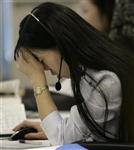 |
 |
 |
||
    |
||||
|
||||

Easing job stress may ward off depression
|
|
Reuters Health
Monday, April 27, 2009

Over a 10-year period, workers who initially reported having high-strain jobs but then later reported perceiving their jobs as being less stressful were at the same risk of major depression as their peers who worked at low-strain jobs for the entire time, Dr. JianLi Wang of the University of Calgary in Alberta and colleagues found.
"These results indicated that interventions targeted to reducing job strain may significantly reduce the risk of depression," they noted in a report in the American Journal of Epidemiology.
In a given 30-day period, 4.4 percent of US workers have major depression, the researchers point out, and work stress, also known as job strain, has been linked to depression risk.
To investigate how changes in job strain over time might influence people's likelihood of becoming depressed, the researchers looked at 4,866 people participating in the Canadian National Population Health Survey. All had reported on their job strain status in 1994-1995 and again in 2000-2001.
The researchers divided study participants into four groups: people with low job strain at both time points; people with high job strain at both points; people with low job strain at the first time point and high job strain at the second; and people who initially had high job strain and then reported low job strain.
Among people with consistently high job strain, 8 percent had an episode of major depression during the study period, compared to 4 percent of those who had low job strain at both time points. For people whose jobs got less stressful, the risk of major depression was 4.4 percent, compared to 6.9 percent for people whose jobs became more stressful.
Within the group of people with high job strain at both time points, the researchers found, only those who rated their health as good or excellent at the beginning of the study were at greater risk of major depression; those who rated their health as poor to fair weren't at increased risk. "These participants may have accepted the reality of having poor health and of exposure to various risk factors for health," Wang and colleagues suggest.
Because how people see their job's stressfulness can change frequently, the researchers call for future studies to measure job strain in shorter time increments to better understand how workplace stress relates to depression.
SOURCE: American Journal of Epidemiology, May 1, 2009.
Reuters Health
© 2009 Thomson Reuters. All rights reserved. Reuters content is the intellectual property of Thomson Reuters or its third party content providers. Any copying, republication or redistribution of Reuters content, including by framing or similar means, is expressly prohibited without the prior written consent of Thomson Reuters. Thomson Reuters shall not be liable for any errors or delays in content, or for any actions taken in reliance thereon. "Reuters" and the Reuters Logo are trademarks of Thomson Reuters and its affiliated companies. For additional information on other Reuters media services please visit http://about.reuters.com/media/.
Related News:
More News on this Date
Related MedlinePlus Pages:
| Home | Health Topics | Drugs & Supplements | Encyclopedia | Dictionary | News | Directories | Other Resources | |
| Disclaimers | Copyright | Privacy | Accessibility | Quality Guidelines U.S. National Library of Medicine, 8600 Rockville Pike, Bethesda, MD 20894 National Institutes of Health | Department of Health & Human Services |
Date last updated: 28 April 2009 |
